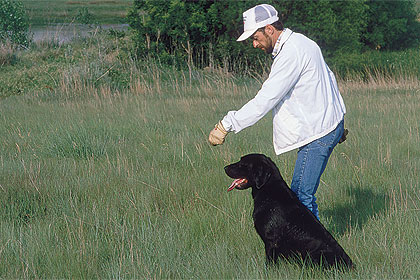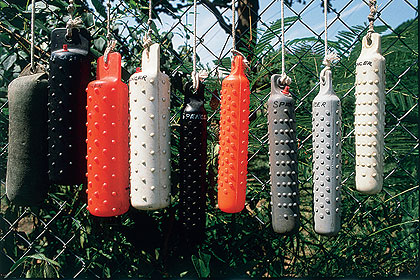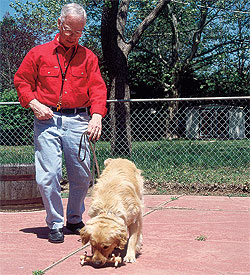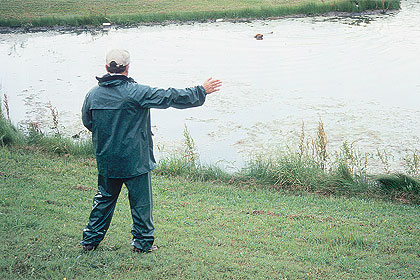Being able to talk the talk will help you walk the walk.
By James B. Spencer
Like those involved in about every other human activity, we retrieverites have our own language. Among the initiated, it facilitates communication, but for the uninitiated, it frequently facilitates confusion, especially since some of our terms have multiple meanings. Thus some definitions are in order. Then, too, some terms have interesting histories that should be passed on. Ergo, I'll define a few of these terms, admitting that this list is incomplete. A full retriever-speak lexicon would probably fill this entire magazine, maybe more than once.
 "Back!" can be used to send a dog from the handler's side on a blind retrieve. |
Back!: This command was first used to cast a distant dog (as in a blind retrieve) farther away from the handler. Since the dog is facing the handler, he must first turn around before he can run farther away.
Later, it also became the command to leave the handler's side at the start of a blind retrieve, the "logic" being that here too the dog runs away from the handler. However, if dogs were completely logical, they would always turn completely around before running, which would be a disaster in this secondary usage.
Fortunately, canine logic only goes far enough to induce them to do whatever their frequently illogical owners train them to do, so they run forward on Back when lining and in reverse when casting.
Blind: This has three meanings. First, it can mean a blind retrieve. Second, it can mean a waterfowl hunting blind. Third, it can mean a holding blind at field trials and hunt tests, where dogs and handlers wait to run a test.
 Bumpers, a.k.a. dummies, come in a variety of sizes, shapes and colors. |
Bumper: This is a cylindrical object retriever trainers frequently use in training sessions as a substitute for birds. We call them "bumpers" because the earliest version was the boat-bumper boaters hang over the sides of their crafts to protect them when tied up to a pier. Hanging on the wall of my office, I still have a large boat-bumper I used back when nothing else was available. Today bumpers come in many sizes, shapes, and colors.
"Dummy" is a synonym for "bumper."
Cold Blind: This is a blind retrieve that is run without accompanying marks. The word "cold" here has nothing to do with the temperature. Perhaps "solo blind" would have been a better term, but to communicate effectively we have to use the language as it came down to us. Incidentally, "cold water blind" means a water blind run without marks; it does not mean a blind run in cold water (although that is quite possible).
Collar: This has two meanings. First, it can mean any sort of collar used in retriever training: chain-collar, strap-collar, slip-collar, and so forth. Second, it can mean the electronic collar, or e-collar, used for sending little e-messages to a distant retriever that isn't doing what he has been trained to do at any particular moment. I've often referred to my e-collar as my dog's "hearing aid."
 "Fetch!" in force-breaking. |
Diversion: This term has changed meanings since the introduction of hunt tests in the mid-1980s. Before then, in field trials, it meant the last bird down in a multiple marked retrieve, so called because it diverted the dog's attention from the "memory bird(s)." But in hunt tests, judges sometimes have an additional bird thrown as a dog returns with a retrieved bird, to test whether the dog might err by taking off after this "diversion" bird.
To avoid confusion retrieverites began using the term "go-bird" rather than "diversion" for the last bird down in a multiple mark.
Dummy: A synonym for "bumper" (see above).
Force-break: This is a structured training process in which the trainer teaches the dog to pick up and hold a dummy or bird on the command "fetch" and to release it on the command "give" (or "leave it" or "out," or whatever). This process was first developed back in the 1880s by David Sanborn, a professional pointing breed trainer, to teach basic retrieving to dogs with little or no natural retrieving instincts. Since most 19th century pointing breed trainers were also horse breakers, and since mild force was used in the process, it was called "force-breaking."
Retrieverites spurned force-breaking for many decades. (Note its negative treatment in James Lamb Free's 1949 book, Training Your Retriever.) They eventually adopted it, first to get reliable delivery to hand, especially in water work, and then for other purposes. Retrieverites have introduced at least two synonyms to make the process sound less harsh: "force-fetch" and "the trained retrieve."
Go-Bird: The last bird down in a multiple mark at a field trial or hunt test. Formerly called the "diversion" (see above), it's called the go-bird because it is the last bird down before the retriever "goes" (on command) to retrieve the marks.
Handle: This term has two meanings. First, it can mean everything the handler does in working his retriever: getting him to and from the line; setting him up; sending him to retrieve; receiving delivered birds; and so on. Second, it can mean directing a distant dog with whistle, voice, and arm signals to a downed bird, whether a blind retrieve or a missed mark.
Heel: This command tells the dog to walk along at the handler's side (left or right) and to sit whenever the handler stops. Since the dog walks beside the handler and not behind him as the term suggests, this term probably has an interesting history. However, I have never heard or read it. If you know anything about this, please explain it in a letter to the editor of Gun Dog.
Hup!: This is a spaniel term, but its history is interesting enough to be included here. In the early days of spaniel training in merry old England, whenever the handler stopped his spaniel, the dog would sit. When he sat, his head popped up above the cover. Thus, handlers started using the command "Up!" to stop their spaniels. But no one can say "Up!" forcefully very often without unintentionally adding an initial letter "H." So "Up!" becam
e "Hup!" and has remained the spaniel trainer's command for "Sit!" ever since.
Line: In field trials and hunt tests, this term has two meanings. First, it can mean the starting point for a test, that is, where the dog and handler are positioned at the beginning of a test. Second, it can mean the line a retriever takes to a blind retrieve. If his line is perfect, he picks up the bird without additional handling, thereby "lining" the blind (a great job).
 "Handle" can mean directing a distant dog to a blind retrieve with whistle, arm and voice commands. |
Non-Slip: A "non-slip" retriever is steady, that is, doesn't leave to retrieve until sent. In England, a lead is also called a "slip." Thus, a retriever that is steady without being restrained by a lead is a non-slip retriever.
Poison Bird: In a field trial or hunt test, this is a bird the dog must not retrieve before he retrieves another bird. If a mark is thrown immediately before the dog is sent on a blind retrieve, that mark is a poison bird. The dog must complete the blind before picking up the mark. If a blind retrieve is planted before the dog runs a marking test, the blind retrieve bird is a poison bird. If the dog stumbles onto the blind before completing the marks, usually by wandering too far outside the area of a fall, he is dropped.
Pop: This has two meanings. First, it can mean shooting a blank gun in a field trial or hunt test. Second it can mean a fault some dogs commit on marks or blinds. A dog pops when, without the handler's command, he stops, sits, and looks at his handler for directions.
Because the dog's head pops up, this was originally called "popping up," but with time the term was shortened to "pop." Thus the derivation of this term is remarkably similar to that of "Hup" (see above).
Pressure: This is an oft-used (sometimes over-used) euphemism for negative training techniques.
Running Water: In field trials and hunt tests, this means water so shallow that the dogs will run through it rather than swim. Such water may or may not itself be running, as in a stream or river. In running water, the dog splashes loudly so he has trouble hearing the boss' whistle.
Okay, students, you now have your vocabulary words for today. Memorize them. Use them. But don't abuse them. Incidentally, I'm sure you'll be greatly relieved to know this: I will not be giving you a test on these words! (However, if you misuse any of them, your training buddies just might give you a grade.)
Nota Bene: Jim Spencer's books can be ordered from the Gun Dog Bookshelf: Training Retrievers for Marshes & Meadows; Retriever Training Tests; Retriever Training Drills for Marking; Retriever Training Drills for Blind Retrieves; Retriever Hunt Tests; HUP! Training Flushing Spaniels the American Way; and POINT! Training the All-Seasons Bird Dog.






